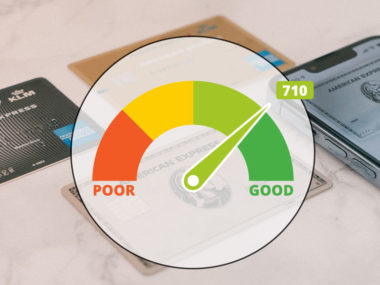Your income does not directly affect your credit score. While having a decent income undoubtedly helps pay rent on time or pay down your loans, income itself is not responsible for a good credit score. In other words, just because you have a high income does not mean that you will have a high credit score, and vice-versa. That said, income can help you earn a good credit score.
Table of Contents
What Does Your Credit Score Mean?
Your credit score is a reflection of your financial health, it shows how responsible you’ve been when it comes to paying off loans. Therefore, your score informs lenders how likely you are to repay a loan. A high credit score is associated with a responsible borrower, while a low credit score is not. The higher your credit score, the more likely you are to be approved for a loan.
What Does Your Income Mean?
Gross and net income are essentially how much you earn in a given period of time. Lenders need this information to determine if you have sufficient funds to repay a loan. Low income can be enough to disqualify you from receiving a loan in the first place. How lenders use your income is detailed below:
Debt-to-Income Ratio
The primary relationship your income has on your credit score is through your debt-to-income ratio. This is a representation of how much you owe (not counting elective spending) compared to how much you earn every month.
Through your debt-to-income ratio, your income can affect your ability to be approved for a new loan. When you decide that it’s time to apply for a loan, the bank takes a look at your current debt and your current income. What they are looking for is a stable debt-to-income ratio.
If they feel that your funds are stretched too thin, they’re likely to deny your loan application. In this way, having a solid income definitely plays a role in whether you will be approved for a loan. The important thing isn’t just how much you earn, but how much debt you have compared to your income.
What Makes a Good Credit Score
A good credit score has balance. It’s a common misconception to think that having a decent amount of money and no loans equals a high credit score. To have a good score, you need to take out loans and build credit.
You also need to keep the balance on those loans as low as possible and make your payments on time. It’s very important to not take out more loans than you can handle. When using a credit card, for instance, the best way to optimize your credit score would be to only spend a small amount and pay it off rather quickly. Having a maxed out credit card, on the other hand, will not help your credit score.
Banks and credit bureaus want to see that you know how to spend responsibly. They need to know that you can handle the credit limit you’re given without overdoing it. Maxing out your credit card racks up fees and interest that make it even harder to pay off your debt. If you’re trying to get approved for a new line of credit, but have maxed out your credit card, your bank is going to be very hesitant to give you more debt.
In the end, a good credit score motto to live by is “work on what you’ve got.” Before you try and open any new loans, work on lowering the ones that you have. Not only will that improve your credit, but it will also open up some room in your finances to be able to comfortably handle a new loan, should you decide that it’s time.
How to Use Your Income to Improve Your Credit Score
In using your income to improve your credit score, you’ll want to break down your income versus expenses and create a budget based on these figures. Knowing exactly where your money is going will help you fine tune your spending and understand where cuts can be made.
Of course, your bills are the most important part of your budget. Consistently making loan payments on time will add positive details to your credit history, which will influence the calculation of your credit score. Student loans, credit cards, car payments, and mortgages all affect your credit score and should be prioritized accordingly. The lower your monthly debt payments, the better your debt-to-income ratio is, and the higher your credit score will be.
In addition, knowing how much room you have left in your budget can help you plan for future expenses, such as buying a new car or home. Being in touch with your finances will help you shop with confidence, knowing what price range you’re comfortable with without hurting your other financial obligations.
Income plays a huge part in having good credit. Without a steady income you wouldn’t be able to apply for a new loan with the confidence of knowing you can repay it, which is what makes for a good credit score. A high income does not equal a high credit score — budgeting and planning for the future do.
Image Source: https://depositphotos.com/





